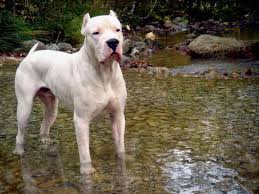
Gull Dong
Conditions of detention
Gull Dongs are best suited to rural or suburban environments where they have plenty of space to roam and exercise. They are not well-suited for apartment living due to their size, strength, and high energy levels.
Useful Fact: A large, securely fenced yard is essential to prevent them from wandering and to provide ample space for physical activity.
Nutrition and diet
A balanced diet of high-quality dog food, suitable for their age, size, and activity level, is crucial for the Gull Dong. Due to their muscular build, they require a diet rich in protein.
Useful Fact: Dividing their daily food intake into two meals can help maintain their energy levels and support healthy digestion.
Health
Gull Dongs are generally healthy dogs but can be prone to certain conditions such as hip dysplasia and other joint issues due to their size and muscular build.
Useful Fact: Regular veterinary check-ups, proper diet, and exercise are essential to maintaining their health and well-being
Grooming and care
The Gull Dong has a short, dense coat that is easy to care for. Regular brushing will help remove loose hair and keep their coat healthy.
Useful Fact: Despite their low-maintenance coat, regular grooming sessions can help detect skin issues or parasites early.
Education and training
Gull Dongs are intelligent and strong-willed, requiring firm and consistent training. They respond well to positive reinforcement methods but need an experienced handler due to their dominant nature.
Useful Fact: Early socialization and obedience training are crucial to manage their protective instincts and ensure they are well-behaved around people and other animals.
Toys and entertainment
Durable toys, such as heavy-duty chew toys and interactive toys, are suitable for Gull Dongs. They enjoy activities that challenge their minds and bodies.
Useful Fact: Engaging in activities like fetch, tug-of-war, and agility training can provide excellent physical and mental stimulation.
Safety
A secure yard with a sturdy fence is important to keep Gull Dongs safe, as they have a strong protective instinct and might try to chase or confront perceived threats.
Useful Fact: Due to their size and strength, using a strong, reliable leash and harness is important for safe walks and outdoor activities.
Accessories
Durable collars, leashes, and harnesses are necessary for handling their size and strength. Comfortable bedding and appropriate travel crates are also beneficial.
Useful Fact: Reflective gear can enhance visibility and safety during nighttime walks or in low-light conditions.
Socialization
Early socialization with other dogs, animals, and people is crucial for Gull Dongs to develop a balanced temperament. They are naturally protective and can be wary of strangers.
Useful Fact: Regular exposure to different environments and social situations can help mitigate excessive protectiveness and promote a well-adjusted demeanor.
Travel and Transportation
Gull Dongs generally adapt well to travel, especially if they are used to car rides from a young age. Secure travel crates or dog seat belts enhance safety during transportation.
Useful Fact: Providing a comfortable, familiar blanket or toy can help reduce anxiety during travel.
Behavior and psychology
Known for their loyal and protective nature, Gull Dongs form strong bonds with their families. They are independent thinkers and require mental and physical stimulation to stay happy.
Useful Fact: Regular exercise, mental challenges, and a clear role within the family structure contribute to their overall well-being and prevent behavioral issues.
Legal aspects
Owning a Gull Dong may be subject to local pet laws and regulations, including breed-specific legislation, licensing, and leash laws.
Useful Fact: Being aware of and adhering to local regulations ensures responsible pet ownership and avoids legal issues.


